In this ever-evolving world, data science is not only a topic, but it is beyond that. Despite its slow start, data science has paced up so much now that it has now become a way of job generation. Industries nowadays work on data-based projects, so the need for individuals with data science knowledge is higher than in other professions. Overall, data analysts or data scientists are in demand due to their top-notch analyzing and researching skills that help different sectors and organizations grow.
The best part is that the need for a data analyst or data scientist is not limited to any particular sector, but nowadays almost every sector needs an expert and experienced data analyst or data scientist. The main role of a data scientist or data analyst in any organization is to collect the raw data and modify it into some useful piece of data so that companies can use it.
|
Trending Data Science Course In Online Mode |
|
In this blog, you will learn all the things about data science. Further, you will also know more about the latest trends, challenges in which industries it has incorporated, and what are the latest career prospects of data science that pay well in India. So, let’s get started.
What are the Latest Industry Trends In Data Science?
As technology continuously evolves, many trends have been introduced in the data science field. In this section, you will learn about a few industry trends in data science in this latest period. So, let’s get started:
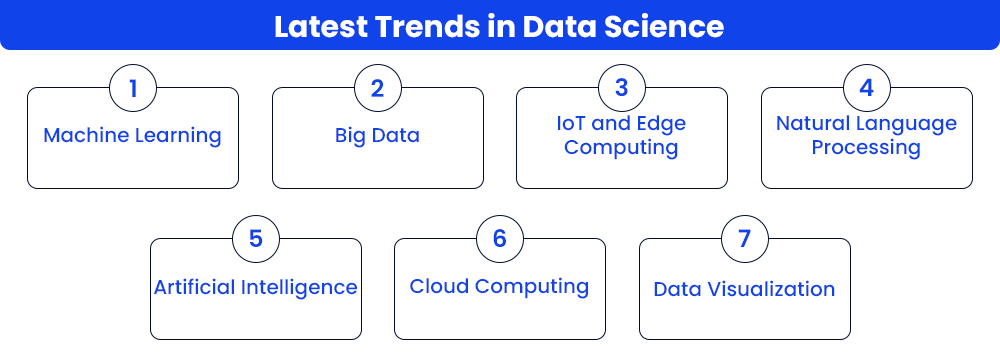
- Machine Learning: Machine Learning (ML) is a subset of artificial intelligence (AI). It is one of the prominent industry trends in data science. It is incorporated in a wide range of sectors such as healthcare, finance, e-commerce, and retail. It helps with fraud detection, predictive analytics, and customer recommendation systems. It continuously upgrades itself by learning the programming without any changes in the data. The ability of Machine Learning (ML) to automate tasks and enhance decision-making processes makes it one of the key drivers of data science innovation.
- Big Data: In today's digital world, some kind of large data is generated almost every second. This kind of large data is known as Big Data. It is usually in unstructured form, which can be problematic to process so much data using traditional methods or tools. Big data technologies like Hadoop and Spark have made it simpler to store, process, and analyze this data. Big Data technologies are often used in various sectors ranging from banking & finance, e-commerce & retail, automotive, healthcare, and telecom. Big data technologies are often implemented in large business firms or multinational companies (MNCs), where almost large and unstructured data is generated which needs to be translated to get insightful information to enhance the company's growth.
- IoT and Edge Computing: IoT (Internet of Things) and edge computing are the new needs of the modern-day world. These things help industries in their transformation by creating smart environments where you can get connected with millions of things and people and can easily share information and data. The IoT (Internet of Things) generates almost a zillion things in a massive amount of data which can be processed and converted the real time. On the other hand, edge computing is an important trend in data science that helps the data be processed closer to the source rather than just generating it. This improves performance, making it ideal for applications like autonomous vehicles, healthcare monitoring systems, and smart cities.
- Natural Language Processing: Natural Language Processing (NLP) is a branch of artificial intelligence (AI) that enables the machine to analyze, understand, interpret, and generate human language and gestures. It plays a critical role in chatbots, voice assistants, sentiment analysis, and machine translation. The demand for natural language processing (NLP) has increased across a diverse range of industries and sectors, such as customer service, retail and e-commerce, and other social media monitoring. As the technology becomes more advanced, its applications will continue to grow, opening up more opportunities for data scientists to work on language-related challenges.
- Artificial Intelligence: Artificial intelligence (AI) is a broader concept that includes a wide range of topics such as machine learning, robotics, computer vision, and other computer intelligence systems. Artificial intelligence (AI) is used to make the operations and other processes smooth to make the user experience better. After the period, the demand for artificial intelligence has increased. Artificial intelligence (AI) is in a diverse range of industries, such as finance, healthcare, retail, and government sectors. AI-based systems are being implemented for fraud detection, customer personalization, and predictive maintenance, to name a few.
- Cloud Computing: The introduction of cloud computing or cloud-based operations acts as a game changer for a wide range of industries and businesses. Cloud platforms such as Amazon Web Services (AWS), Microsoft Azure, and Google Cloud have made data storage, processing, and analysis more accessible and scalable. The demand for cloud computing has increased in India as cloud computing is more flexible and cost-effective. It helps companies to move their data and applications to the cloud without any hassle. Usually, businesses generate more data, and therefore, cloud computing or cloud-based data science helps the industry and business to grow efficiently.
- Data Visualization: Data visualization is the process of graphical representations of data analytics. It helps the authorities to make insightful decisions by translating complex data into a visual context. Tools like Tableau, Power BI, and Python libraries like Matplotlib are widely used in India to create interactive dashboards and visual reports. As the demand for data-driven insights increases, the ability to present data effectively through visualization becomes more crucial.
The Outlook for Data Science in India
In a short span, data science has become one of the most demanding topics. Not only from the point of view of education but as an employment-generating field, data science has replaced many industries. Nowadays, employees and companies are more particular about data science due to its strong need and good salary package.
In fact, as per the analysis of Outlook Business, there are major chances that the data science education market will rise by 58% to USD 1.4 billion by 2028. Along with that, according to their research, there will be an uplift of approximately 57% in data science jobs in the upcoming 5 years, from 2.1 lakh this year to 3.3 lakh by 2028. Since there is a high chance that data science may contribute to the Indian economy sector in the future years.
Future Career Prospects of Data Science
As was earlier discussed, data science has given life to many more careers that are in high demand nowadays and leave you with a high-priced salary package. From data analyst to AI research scientist, there are a wide range of career options available in data science in India.
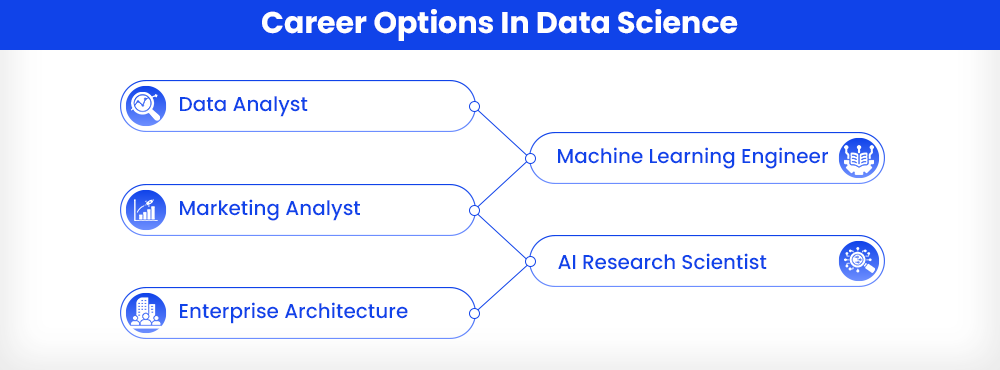
- Data Analyst: Data analysis is one of the prominent careers that you can opt for if you have a keen interest in data science. The role of a data analyst is to collect, analyze, and interpret the data and to help the business grow efficiently. The average salary package of a data analyst ranges from INR 4,00,000 to 10,00,000 per annum.
- Machine Learning Engineer: After the data analyst, machine learning engineering is the next best career option which you can opt for. A Machine Learning Engineer is responsible for designing, building, and maintaining artificial intelligence (AI) systems that can mimic human thought processes. It includes data preparation, model development, system development, model maintenance, technical support, troubleshooting, and so on. The average salary package of a machine learning engineer ranges from INR 6,00,000 to 18,00,000 per annum.
- Marketing Analyst: Marketing Analyst is another career option that you can choose if you have an interest in data science. A marketing analyst is responsible for analyzing the marketing trends, consumer behavior, segment markets, and competitors and planning the strategy accordingly. Researching & analyzing consumer data and user experience is also the duty of a marketing analyst. They can predict these things by identifying trends and predicting future buying patterns, enabling businesses to improve their marketing ROI. If you are willing to become a marketing analyst, you can earn an average salary package ranging from INR 5,00,000 to 6,00,000 per annum.
- AI Research Scientist: The Artificial Intelligence (AI) Research Scientist is also on the list of the top career options in data science. Artificial intelligence (AI) research scientists usually focus on the advancement of artificial intelligence with the help of innovative research and development. The demand for artificial intelligence has been boosted as they have shifted their boundaries to machine learning, natural language processing, computer vision, and robotics. Many Indian startups and multinational companies are investing in AI research to create smarter systems and improve operational efficiencies. On average, an artificial intelligence (AI) research scientist can earn up to INR 12,00,000 to 25,00,000 per annum
- Enterprise Architect: Enterprise Architecture is a new term in the data science industry. An enterprise architect designs and implements an organization’s technology framework, ensuring that data systems, applications, and infrastructure are integrated efficiently. In the context of data science, this role involves working with large datasets, creating scalable solutions for data storage and processing, and ensuring that the enterprise's technology stack supports advanced analytics and AI-driven applications. In India, an enterprise architect can earn a high-priced salary package of up to INR 17,50,000 to 40,00,000 per annum.
The Challenges Of Data Science
Although data science has a wide array of trends and benefits, it also has a wide range of challenges that you may face while working with data science or in the same field related to data science. In this section, you will learn more about a few challenges of data science. So, let’s get started.
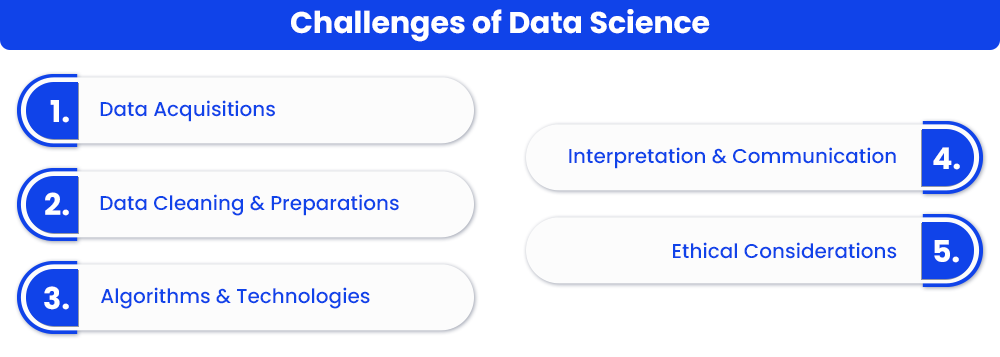
- Data Acquisitions: The first step in data science is gathering the right data. Collecting the accurate and right data is very crucial in the data science field. However, acquiring high-quality, relevant data can be a daunting task. In India, many organizations struggle with data silos, lack of access to structured data, and issues related to data privacy. Furthermore, data from Internet of Things (IoT) devices and sensors may be noisy, incomplete, or inconsistent, which can lead to inaccurate results if not properly handled.
- Data Cleaning & Preparations: After the collection of accurate data, it needs to be cleaned and prepared before it can be analyzed. This step is time-consuming and involves identifying and fixing errors, removing duplicates, handling missing values, and transforming data into a usable format. Poor data quality or unstructured data can lead to inaccurate analyses, making data cleaning a critical and often labor-intensive task for data scientists.
- Algorithms & Technologies: Data science involves the application of complex algorithms and technologies. Therefore, selecting the correct algorithms for a specific task is important to get accurate outcomes. However, with the vast array of tools and technologies available, selecting the appropriate ones can be a daunting task for organizations. In India, many professionals face a skills gap, as the demand for expertise in advanced algorithms, deep learning, and artificial intelligence technologies often outpaces the availability of skilled talent.
- Interpretation & Communication: Data scientists often face the challenge of effectively communicating the insights derived from data. It is not enough to simply analyze the data; the results must be presented in a way that is understandable to non-technical stakeholders. In India, many organizations lack professionals with the ability to interpret complex analyses and communicate them in an actionable manner to decision-makers.
- Ethical Considerations: With the increasing use of data comes the responsibility to handle it ethically. Data privacy, security, and bias in algorithms are significant concerns in the field of data science. In India, the absence of a comprehensive data protection law adds to the complexity of ensuring ethical use of data. Data scientists must be vigilant about these issues to build trust with users and stakeholders.
Industries That Incorporate Data Science
The application of data science extends across virtually all industries, transforming how businesses operate and make decisions. Let’s explore some of the major sectors in India that are incorporating data science to drive innovation and efficiency:
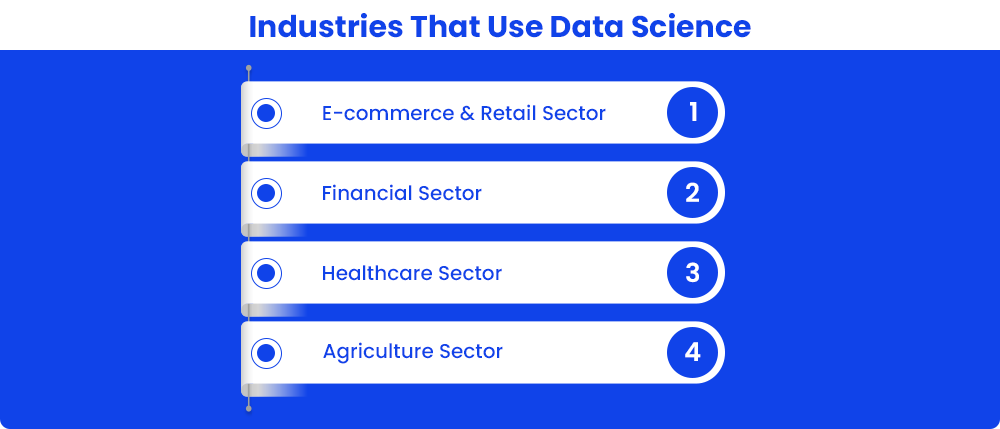
- E-commerce & Retail Sector: The e-commerce sector in India has witnessed explosive growth in recent years. Companies like Amazon, Flipkart, and Myntra are leveraging data science to enhance customer experience, predict buying patterns, optimize inventory, and offer personalized recommendations. Data science also helps e-commerce companies improve supply chain management and pricing strategies.
- Financial Sector: In the financial sector, data science is used for credit scoring, fraud detection, risk management, and customer segmentation. Indian banks and fintech companies rely on predictive analytics and machine learning to analyze vast amounts of transactional data and detect potential fraud. Moreover, algorithmic trading, robo-advisors, and personalized financial recommendations are becoming increasingly popular in India’s financial landscape.
- Healthcare Sector: Data science is transforming the healthcare industry in India by improving patient care, optimizing hospital management, and enabling predictive diagnostics. Machine learning models are being used to analyze medical images, predict disease outbreaks, and personalize treatment plans for patients. With the rise of health tech startups, data science is playing a crucial role in making healthcare more accessible and efficient.
- Agriculture Sector: In India, agriculture is a critical sector that employs a significant portion of the population. Even, today, almost 60-70% of the population makes their earning with the help of agriculture. However, with the advent of technology and other developments in digital devices. The agricultural sector has upgraded itself. Therefore, the introduction of data science and artificial intelligence is very crucial in the agricultural sector. Data science has the potential to revolutionize farming by optimizing crop yields, predicting weather patterns, and monitoring soil health. Using IoT devices, drones, and satellite imagery, data scientists are helping farmers make data-driven decisions to improve productivity and reduce costs.
Conclusion
Making a career in data science can be a fascinating option as it leaves you with a high-priced salary package and high-esteemed job profiles such as machine learning engineer to data scientist. However, with the advancement of technology, the ever-evolving shifts in the information technology sector can make complex changes in data science and artificial intelligence, people in the field of data science need to keep themselves updated to be in the field of data science.

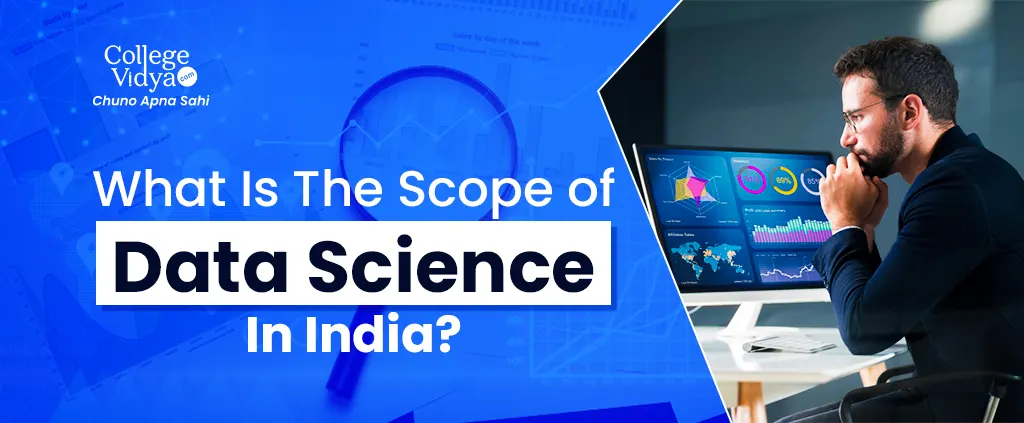




![How To Become A Data Scientist [A Complete Guide 2026]](https://d1aeya7jd2fyco.cloudfront.net/blog/how-to-become-a-data-scientist-comprehensive-guide.webp)









